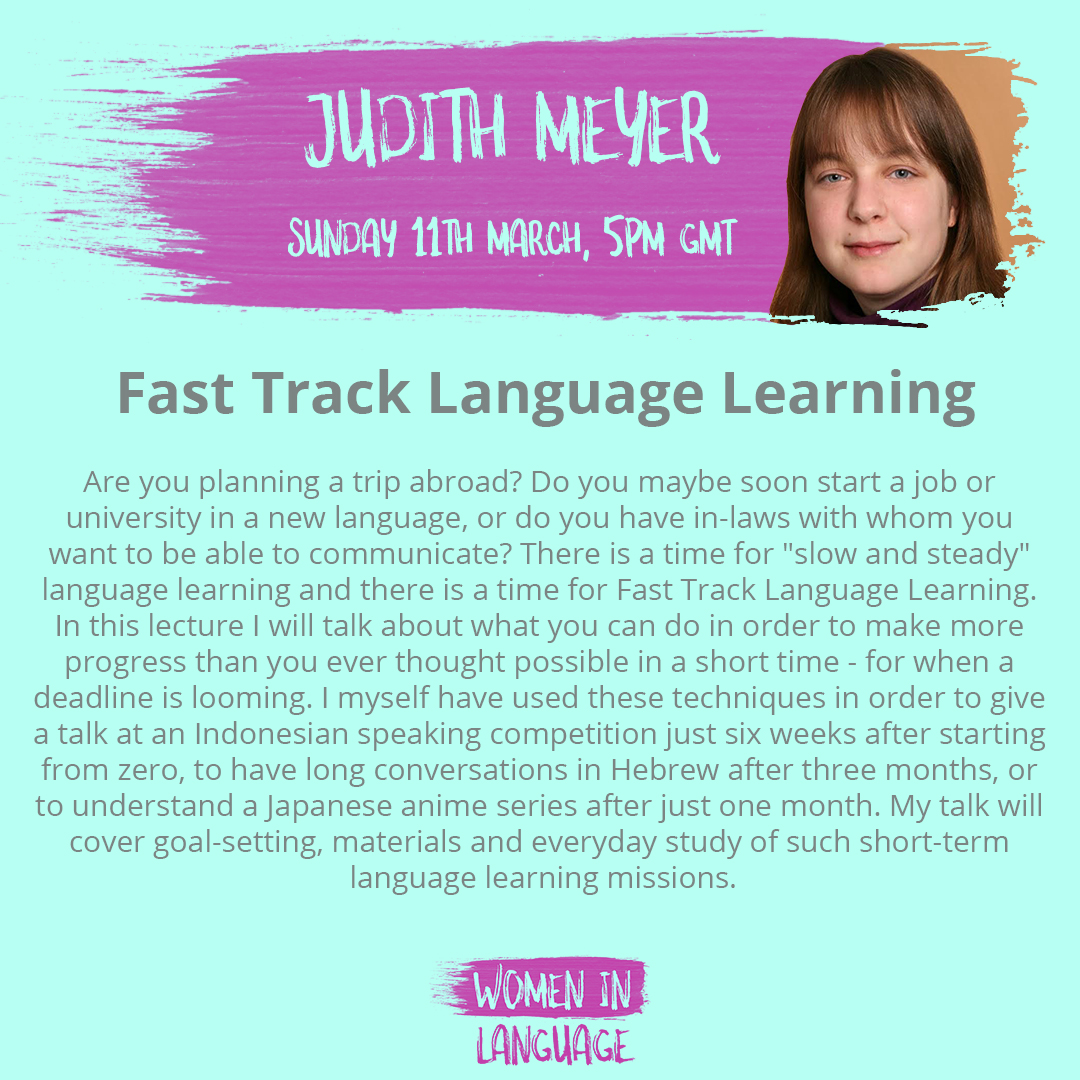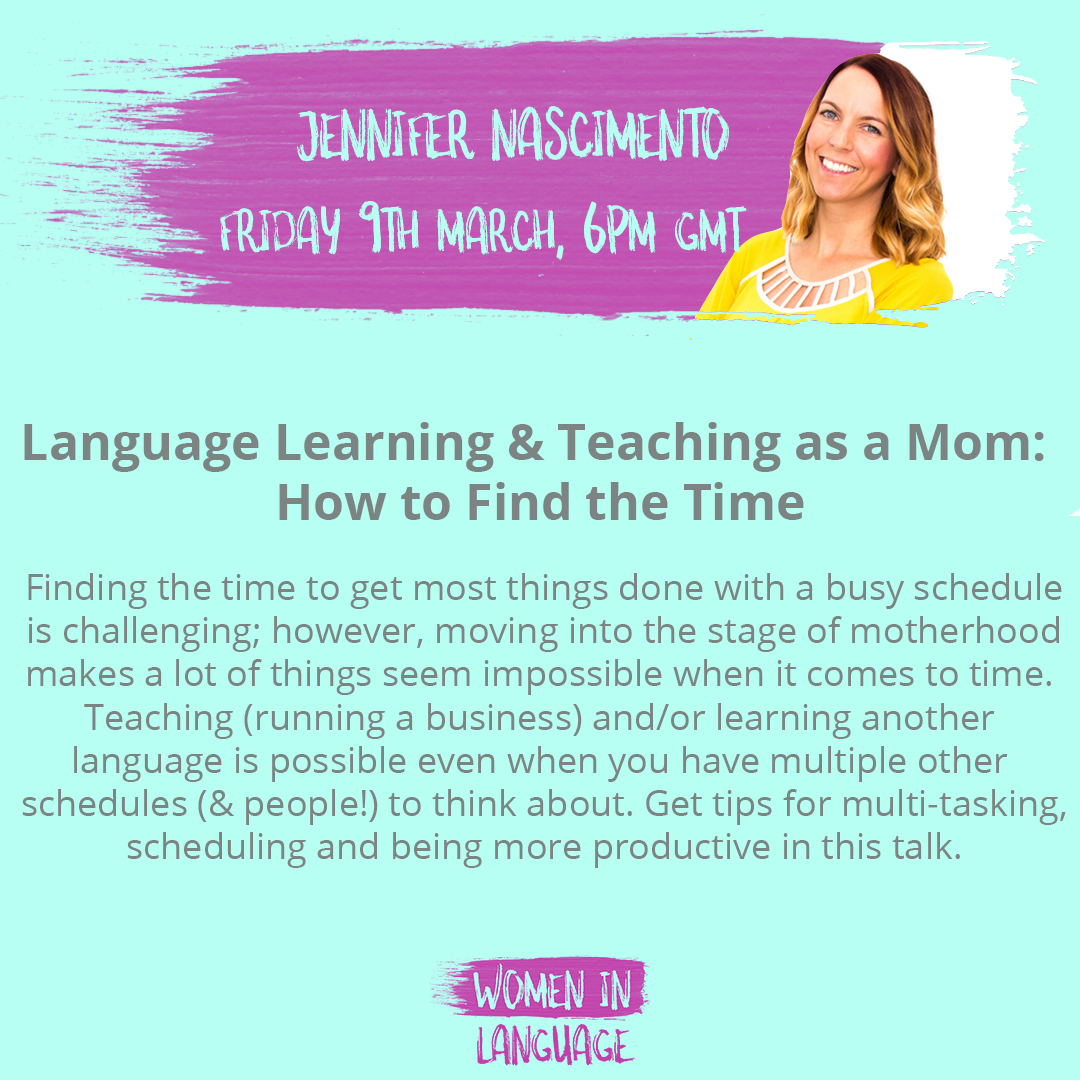A few weeks ago, I was proud to co-organise and witness the first ever Women in Language conference, a unique online event designed to champion, celebrate, and amplify the voices of women in language learning. It was not my first online conference about language learning, but certainly the first I partly created and the first one ever to feature an all-female line-up of speakers.
In today’s article, I am going to lift the curtain and share my official de-brief as one of the three members of our organising team.
What I Felt at Women in Language
Let me start with the most important thing: I enjoyed every single presentation that I saw. And as I was often online making sure everything went smoothly, those were almost all of them. The quality of our many speakers at Women in Language was excellent, and the range of topics kept things interesting and inspiring.
Women in Language delivered on a few extra levels too. It felt as inspiring and intense as every offline conference could feel, with the added bonus of allowing me to sleep in my own bed. I adored seeing #womeninlanguage posts on social media, and to hear from our attendees in the live chat and Facebook group. And most importantly, I got SO inspired and motivated to learn languages in a brand new way!
What I Learnt About Language Learning
A lot of the impact of four days of language love cannot be put into words. It’s a boost in motivation, a renewed commitment, a burst of energy. And at Women in Language, I got all of those out of it and more. I got to know more of our conference attendees and boosted my own desire to learn and teach languages in new ways.
Here are the most important lessons from Women in Language that will be essential for all language learners:
1) Dabbling Is Legit
At Women in Language, we celebrated the huge diversity of how people learn languages. You can choose whatever language you want to learn, and you can learn it for 2 weeks or 20 years, and you can dabble in a handful of languages at once if you want to. This is all “allowed”, and won’t make you any less of a language lover or polyglot.
Sometimes it’s easy to feel self-critical as a language learner, and to tell yourself that you’re doing this wrong if you don’t use Anki or speak from day 1 or spend many hours on your project. But dabbling is perfectly legit, and you are allowed to feel proud of it.
2) Compassion Matters
Leading on from the previous point, compassion was a regular theme of the conference. When you’re faced with so many blog articles and Instagram posts and YouTube videos and language books telling you what to do, it’s sometimes hard to remember that everyone has a bad day.
You can’t always be happy and you can’t always be 100% gold in Duolingo. Compassion means allowing understanding and empathy for yourself when times are tough, but also for other language learners. No one method is the right one. Allow other people to feel good about themselves, and extend that same kindness to yourself.
3) Everyone Loves Transcribed Audio
Finding something interesting to watch or listen to, at the right level, and then with a transcription…that’s difficult. But it’s also what a lot of our conference attendees wanted, and you certainly CAN find it online. If you want to get a few ideas, check out Speechling, Glossika, Rhinospike, and Movieclips on YouTube.
And by the way: Just listening is NOT enough. If it’s just a wall of sound, you’re not doing much good. You’ll need to know what you’re hearing. Find input that you can engage with, and check against your own skills. For more about this, listen to my podcast episode about listening skills.
4) There’s So Much to Talk About
It’s never enough to practice speaking by doing the “Hello how are you where do you live” dance over and over again. Speaking practice is best when you’ve prepared something interesting to talk about. And lucky for us, there are tutors and learners who already discovered this too, and they’ve even put together lists (like this one) of questions and conversation prompts.
5) When Your Brain Is Having Fun, You Learn
All too often we think of language learning as a STUDY activity, in all caps. But it’s just not necessary to do things this way. Language can be learnt through story, through fun activities, through play. The most important things are exposure and repetition, not how hard you study or how much your language experience feels like work.
Though some of these lessons may read as happy-clappy positivity notes, I found that they often helped to ease a learner’s mind and allow them to take a break and come back to language learning with new energy and enthusiasm. After all, we want to get fluent while having fun, right?
What Do You Think?
Whether you attended Women in Language 2018 or not, what do you think about those lessons above? Are you a dabbler, or a hardcore study nut? Leave me a comment below to join the conversation.
In part 2 of this blog article, I will put on my co-organiser hat (a very stylish hat, for sure) to tell you more about how Women in Language was organised, what we learnt in the process, and what you should consider if you want to run or contribute to an event like this in future.
Organising A Successful Online Conference
I’ll start with what we looked for in our speakers and talks.
For this first ever conference, we used our own network of interesting women to ask if they wanted to speak at Women in Language. Their social media accounts, blogs, youtube channels, relationships with us were what put them on the radar. So if you’re dreaming of speaking out yourselves, making yourself very visible is good advice.
Before contacting our speakers, we considered some guidelines about the types of talks we would be looking for. In addition to practical topics featuring tips and techniques for language learners at “Beginner” and “Advanced” levels, we also chose the tracks “Living with Language” and “Working with Language”. Each speaker we contacted let us know which of the four themes they would like to address in their presentation, and was allocated one. This way, we ensured that no topics would be repeated and we could offer a varied programme on every single conference day.






